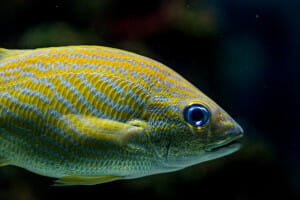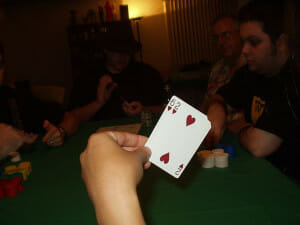What is a “Fish” in Poker – A Definition

By Steve Beauregard
“If you can’t spot the sucker in your first half hour at the table, then you ARE the sucker.” – Mike McDermott, from the 1998 film ”Rounders”.
In poker, a fish is the sucker at the table. Also known as a “donkey,” or “live one.” It’s a derogatory term for someone who is not very good at poker.
While there is no official definition of a poker “fish” in the dictionary, it’s widely accepted in poker circles that the fish at the table is the player who is playing very poorly.
Maybe they play way too many hands. Perhaps they only call bets and never raise. Maybe they stay in the hand until the very end, hoping to make a pair, when there are 8 other players in the hand, and numerous straight, flush, and full house possibilities showing on the board. Perhaps they check in last position when they have the nuts.
Or maybe – and I’ve personally seen this at the table – they don’t even know the hand rankings, and have to ask the dealer if a flush beats a straight.
Playing Poorly
Fish are the players who are playing very poorly.
(Here’s some video of what some would call fishy play by well-known players)
Notice I didn’t say they were players, “who are losing.” Fish can, and do win on occasion.
Play poker for any length of time, and you’ll have a situation where you’re pocket Aces get beat by somebody holding something ridiculous, like a 2 and 7. The fish played poorly, but won that time. And he or she may crack your aces again with a bad hand, and again that night. It’s poker. It happens.
So fish can win. Which is good in the long run for poker, even though it doesn’t feel that way when you’re watching him scoop up your chips. A fish winning occasionally is necessary, otherwise they would never keep coming back.
Overall in the long run, a fish is going to lose a lot of money to you, and the other players at the poker table.
New Does Not Equal Fish
Just because you are new to poker, doesn’t make you a fish.
A fish may or may not be a new player to the game. Someone who has read a lot of poker books, followed strategy forums online, and knows what to hold and when and how much to bet can’t be labeled a “fish,” even if it’s their first time playing.
However I’ve played with men in their 80’s, who have literally over a half century of poker experience under their belt, who can be accurately described as a fish.
It’s all about how you play.
Moments of “Fishiness”
More specifically, it’s how you play in that particular game.
A very drunk or high player who is the fish at your table at 2:17 a.m. may show themselves to actually be an excellent player when sober the next afternoon.
Whether it is due to tilt, something going on in their personal lives, or the result of mind-altering substances, a good player can suddenly become a “fish.”
Just like a great NFL quarterback can play like a bad rookie in a game, a great poker player can be a fish at times.
Perhaps no better example of this is someone for whom many consider the greatest poker player of all time, Stu Ungar.
Stuey “the kid” Ungar won three WSOP Main Events, and tens of millions on the poker felt, yet his drug habit ate away at his sharp mind, eventually taking away lot of his poker skills.
Just weeks before he would die of drug-related causes in a seedy Las Vegas motel room, Stu was staked in a $5,000 freeze-out game at the Bellagio. He would quickly lose that, along with a good chunk of the $25,000 he came in with.
According to Nolan Dalla and Peter Alson’s excellent Ungar biography, “One of a Kind,” Stu Ungar, the best poker player to have ever lived, “was the live one in the game.”
No else than Erik Seidel admitted, “That game was pretty much built around him.”
So even the best poker players can have “fishy” periods at the table. This can be caused by intoxicants, such as in the case of Ungar, or Mike Matusow. Or it can be by choice.
Choose to be a fish?
At the 2005 WSOP, I was playing in your standard $1/$2 No-Limit cash game in the Rio Hotel and Casino’s Amazon ballroom, when a buzzed twenty-something Swede sat down next to me.
After throwing down a wad of hundred dollar bills and trying to buy-in for $2,000 (he couldn’t, the max buy-in was $200), he proceeded to summons the cocktail waitress and order not one, but two double-vodka and Red Bulls.
In the next hour, he bet, and drank, and raised, and re-raised, and once even went all-in pre-flop blind. That is to say, he went all in before the flop without even looking at his cards!
What a fish, right?

Right, but I got to talking with him and found out his name was Fredrick Halling, aka “H@llinggol” on PokerStars.com. If that name doesn’t ring a bell, H@llinggol was one of the first online poker legends. Entire threads on the 2+2 poker forum discussed his play. He played, and won hundreds of thousands of dollars (if not millions), at the very highest online stakes in the world.
Was this guy a fish?
Yes, at that moment he was. Normally one of the most dangerous sharks in the poker waters became a little minnow for an hour, playing as bad as you could possibly play.
But that’s only because he wanted to be. He was drinking and donking around in the low limits as a way to blow off steam. After all, what’s losing a $200 pot mean to you when you just won $50K on your computer upstairs in your room?
My point is that the term “fish” is game-specific, and not a long-term, permanent label. We’ve probably all have been a fish at one point or another. It’s our job to try to play optimally so that when we sit down at the poker table, we can spot the fish.
And thank goodness for the fish, for they make the game of poker much more fun, and enjoyable. (Photos courtesy of Tambako The Jaguar and Michael Doss via Flickr).
